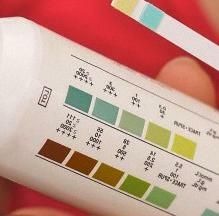 Very often, on the basis of blood glucose levels, the condition of various systems and organs of the human body is determined. Normally, sugar should not exceed 8.8-9.9 mmol per liter.
Very often, on the basis of blood glucose levels, the condition of various systems and organs of the human body is determined. Normally, sugar should not exceed 8.8-9.9 mmol per liter.
If its level in the blood rises, the tubules of the kidneys lose the ability to normally suck in blood from urine an increased amount of glucose. It is as a result of this that glucose appears in the urine - this process is commonly called glucosuria.
Causes of sugar in the urine can be very diverse. Thus, glucosuria may appear due to insulin deficiency, due to a decrease in renal (or hepatic) functions, impairment hormonal regulation of carbohydrate metabolism, and also because of excessive consumption of a large amount of carbohydrates.
Preparation for the analysis
To collect urine for daily analysis you need to prepare mentally and physically. Indicators can be distorted due to stress and overload, both emotional and physical. All this should be avoided to the extent possible.
When collecting daily urine, you need to pay attention to your diet: you must exclude from the diet citrus fruits (oranges, grapefruits), buckwheat porridge, beets, because the listed products change the color of urine. And, of course, when you collect urine for glucose, you can not eat sweet.
The norm of sugar in the urine
At the normal state of health of the body, the glucose content in the urine is very low, its indices range from 0.06 to 0.083 mmol per liter. This sugar content in the urine is not detected when conducting laboratory methods of research (biochemical analysis of urine, general urine analysis).
Diabetes
One of the causes of the appearance of sugar in the urine is diabetes. In this case, sugar is found in the patient's urine when the blood glucose is significantly reduced. Most often this pattern is observed in insulin-dependent diabetes mellitus. In this process, sugar can be absorbed into the blood through the renal tubules only when it is phosphorylated by the enzyme hexokinase.
Signs of diabetes are: decreased or increased body weight, increased appetite, frequent urination (polyuria), thirst, and also reduced resistance to infections, slow healing of wounds, itching in the area of external genitalia, decreased vision and some others.
Causes of Sugar in the Urine
What does it mean? Sugar in the urine can appear due to a variety of diseases. The main causes of this phenomenon are an increased concentration of glucose in the blood, an impaired kidney filtration mechanism, or a delay in the reabsorption of glucose in the tubules.
Causes of increased glucose (sugar) in the urinemay be the following circumstances:
- the first disease that has the highest percentage of diagnoses is diabetes (both first and second type),
- hyperthyroidism,
- illness of Itenko - Cushing,
- pheochromocytoma,
- acromegaly,
- hereditary tubulopathy (de Toney-Debre-Fanconi syndrome),
- renal failure,
- pregnancy.
Physiological causes of increased blood glucose:
- Alimentary Glucosuria- develops as a result of a short-term increase in blood glucose levels above the threshold for the kidney values after eating foods rich in carbohydrates.
- Emotional Glucosuria- the level of blood sugar can greatly increase against a background of stress.
- In pregnancy- physiological glucosuria in pregnant women
Based on a significant list of reasons that can provoke this pathology, we can conclude that the appearance of sugar in the urine - an indicator of pathological changes that affected the human body and an incentive factor, which should make the patient seek help from a doctor.
Symptoms
The glucose indices can fluctuate, both in men and in women. It depends on age and lifestyle, diet and other factors. If sugar has increased once, do not panic, it is better to retake the tests.
With a high sugar content in the urinethe following symptoms occur:
- strong thirst;
- constant desire to sleep;
- irritation and itching in the genital area;
- feeling tired;
- sudden loss of body weight;
- frequent urge to urinate;
- dry skin.
If you have any of these signs, you should consult a doctor to get a check-up and make a diagnosis.

How to choose probiotics for the intestine: a list of drugs.

Effective and inexpensive cough syrups for children and adults.

Modern non-steroidal anti-inflammatory drugs.

Review of tablets from the increased pressure of the new generation.
 Antiviral drugs are inexpensive and effective.
Antiviral drugs are inexpensive and effective.



